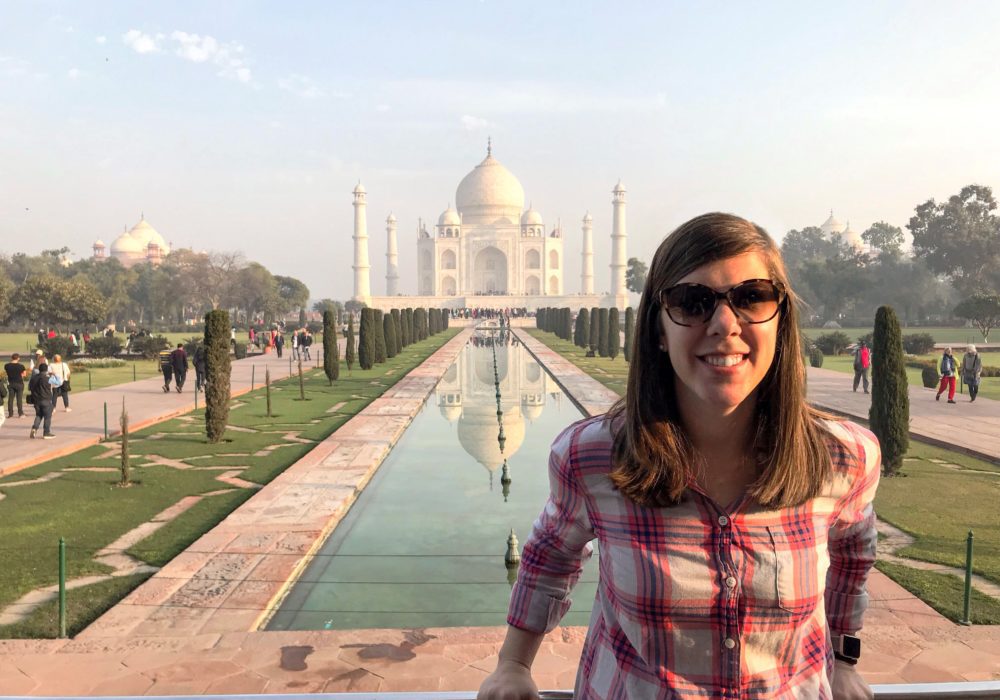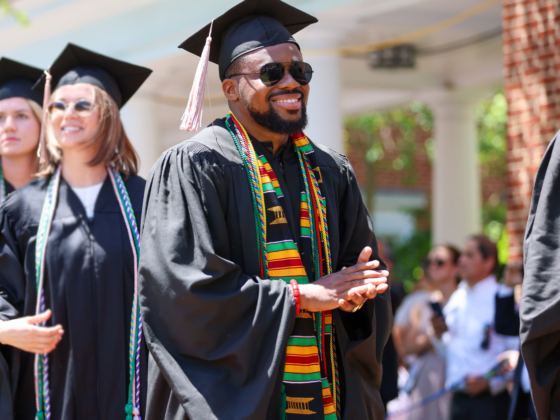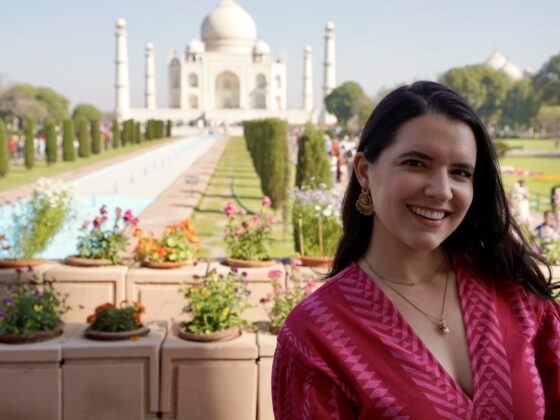Recent alumna Rebecca Barkley (MBA ’19) shared reflections from four Darden global academic opportunities she participated in before graduating with the Class of 2019 this past weekend. In her own words:
Could you share a bit about your life before Darden, and why you decided to pursue a business degree?
I am from Houston, Texas and studied civil engineering at Texas A&M University. Immediately following my undergraduate degree, I pursued a master’s in civil engineering from Cornell University. After graduating from Cornell, I spent several years working in transportation planning before transitioning to work in supply-chain management for a global cement manufacturer.
While working in supply-chain, I gained exposure to several different business functions ranging from operations to marketing and sales. I realized through those interactions that there were many business concepts that I did not have the opportunity to learn through my engineering degrees. I wanted to develop a stronger and well-rounded skill set and the best way for me to accomplish this was through pursuing an MBA degree.
Before attending Darden, did you have plans to take part in Darden’s global academic offerings?
Before attending Darden, I knew I wanted to take part in a global experience in order to increase my international exposure; but, what I did not know was the number of different global academic opportunities I would have available to me. Initially, I really wanted to travel to South America through the Global Immersion Courses, as the company I worked for prior to Darden had several operations in South America and I found it intriguing how businesses operate in uncertain and unstable economic circumstances.
After discussing various global academic opportunities with second year students, I ultimately chose to participate in a Kaizen project with Fortive in China during my first year because I was interested in operations and learned from second year students how great their experiences were with these projects. At the end of my first year before my summer internship, I also decided to travel to Germany for a Darden Worldwide Course studying artificial intelligence and robotics. At the time, this was a new DWC and I thought the topic was interesting and relevant given the advancements in technology of the last several years. During my second year, I chose to participate in a Global Consulting Project because I planned to pursue a career in consulting full-time and I thought it would be a great way to practice the skills needed for my career in a relatively low-risk environment.
Please expand upon your exchange experience with the Indian School of Business (ISB) in India. What attracted you to the exchange program and why did you choose ISB?
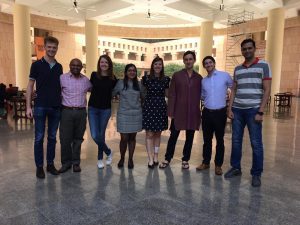
One of my biggest regrets from undergrad was not participating in a study abroad program because I love to travel and experience new cultures, but did not take advantage of the various options to do so when I had the chance. When I discovered that Darden offered exchange programs, I became immediately interested. Of all the programs offered, I chose to attend the Indian School of Business because the school provided a wide variety of courses that were different from what Darden offered, which would give me more exposure to different business concepts that peaked my interest. I also chose ISB because I had not yet had the opportunity to travel to South Asia, an area of the world I may not have otherwise visited. One of the highlights of my time at ISB was the opportunity I had to travel throughout India and Nepal with other exchange students on weekends and for a few weeks after the term ended.
How did completing the Kaizen project and participating in the Darden Worldwide Course (DWC) in Germany in your first year influence your decision to participate in a longer-term program abroad with ISB in India?
I had great experiences traveling to China for the Kaizen project with Fortive and to Germany for the DWC in my first year. I knew that I wanted to participate in another global offering second year, but I was more inclined to consider the exchange program to a different location so that I could gain a new perspective. I also wanted to spend more time abroad than a one- or two-week DWC, so the exchange program felt like a good option to continue learning and gaining global experiences.
The DWC in Germany and exchange program at ISB in India both offer insights into the business fields of two culturally different countries. How would you compare your experiences in and key takeaways from each program?
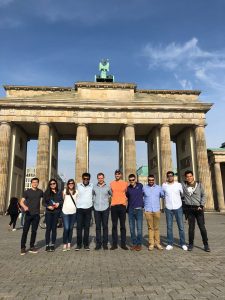
The DWC in Germany focused on artificial intelligence (AI) and technological unemployment. We visited a number of companies throughout Germany to better understand how they applied AI and other emerging technologies in their businesses. We also visited universities in several cities to understand current research in these areas, as well as to learn how Germany’s education system differs from that of the U.S. I found it fascinating that at some universities in Germany, there is a strong relationship between universities and corporate employers. Students apply to an internship at a company instead of the university and, if accepted to the position, they will alternate between going to school and working at the internship. I think it exemplifies how Germany is progressive in developing their students to be strong contributors to their society. In addition, I witnessed Germany’s openness to innovation and could see why Germany is one of the most highly developed industrial nations in the world.
My experience in India was drastically different from Germany. India is an incredibly populous country experiencing rapid growth. The challenges facing businesses and the government to keep up with the demand on the country’s infrastructure and resources fascinated me, especially given my background in civil engineering. IT services are incredibly important to the Indian economy and, similar to Germany, I believe AI could provide tremendous strategic value to these organizations. However, I think many cultural and economic factors likely influence the adoption rate of this technology. For example, the low cost of labor and higher levels of unskilled labor in India may make companies less receptive to investing in emerging technologies that would eliminate jobs, like what we studied in Germany.
Please share more about your Kaizen project and Global Consulting Project experiences. What practical business experience, skills or knowledge did you gain from these projects, especially outside of the classroom setting?
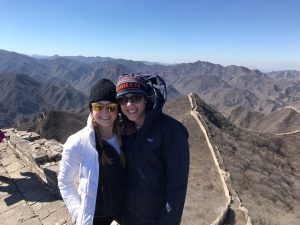
Both the Kaizen project with Fortive and the global consulting project provided me with tremendous real-life experiences and opportunities to apply core business knowledge and skills. With my interest in a career in operations consulting, participating in a Kaizen project provided me direct hands-on experience in this industry. Our project team entered a workplace setting in which we did not have any previous experience or knowledge and, after evaluating its operations, we utilized Kaizen skills and tools to create improvements that had significant business impact. The most rewarding aspect of the experience was monitoring the key performance indicators (KPIs) to determine exactly how much impact our team made on the organization. I enjoyed the experience working in a culture and language different from my own, and respected the humility, curiosity and intelligence of the Fortive managers. I even learned a few words in Mandarin during my time there!
The purpose of my global consulting project was to assess prime opportunities for acquisition in Western Europe for a U.S.-based manufacturer. While I had exposure to a variety of manufacturing environments prior to this GCP, the project enabled me to better understand how manufacturing business strategies vary across industries and geographies, as well as the challenges faced by global companies developing inorganic growth strategies and how they evaluate acquisition targets, as a result. Additionally, I further refined my client interaction skills through the project, which will be critical for my career in consulting after Darden.
Any advice for students trying to decide which global academic courses to take at Darden?
Students should think about their unique interests and determine what they hope to gain from the global academic courses Darden offers. Darden has so many opportunities to consider that students can find something to fit their needs. I would also suggest being open to more than one opportunity, as I learned diverse and valuable lessons during each one of my global experiences at Darden!

